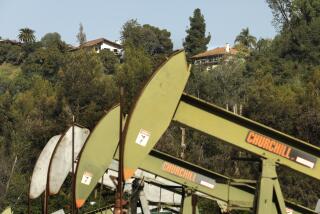Judge changes Prop. 23 ballot description
- Share via
A Sacramento Superior Court judge Tuesday amended the ballot description of Proposition 23, the November initiative that seeks to delay the state’s global warming law.
Judge Timothy Frawley agreed with backers that parts of the original language were misleading and would prejudice voters. The new language changes the description of the law’s intended target from “major polluters,” a term Frawley criticized as having “an obvious negative connotation,” to “major sources of emissions.”
Frawley also ordered removed a reference that Proposition 23 would cause the state to “abandon” its law to control greenhouse gases. The new language will say the initiative would “suspend” the law.
The ruling came in a lawsuit by the Howard Jarvis Taxpayers’ Assn. against state Atty. Gen. Jerry Brown, who drafted the title and summary of the initiative for the ballot. Brown, who is also the Democratic nominee for governor, called the judge’s ruling reasonable and said he would not appeal.
The tussle over a handful of words might seem arcane. But the title and summary printed on ballots can influence the outcome of an election when it comes to voting on a slew of complex initiatives, which is why the language often ends up in court.
Anita Mangels, a spokeswoman for the Yes on 23 campaign, called the ruling “a tremendous victory. It is much clearer now that Proposition 23 is not a blanket repeal of every anti-pollution measure the state of California has ever enacted.”
But Jane Warner, president and chief executive of the American Lung Assn. in California, countered: “Despite the court’s changes, the simple fact remains: Proposition 23 is a deceptive proposition bankrolled by Texas oil companies that will kill California’s clean air and clean energy standards, resulting in more pollution.”
The initiative was launched by San Antonio-based Valero Energy Corp. and Tesoro Inc., which operate refineries in California. It would suspend AB 32, the greenhouse emissions law that is the strictest in the nation, until the state’s unemployment rate drops to 5.5% for at least a year, which has not occurred in three decades.
Under AB 32, emissions from transportation, industry and other sources would be slashed about 15% from today’s levels by 2020. Its suspension would delay such regulations as a low-carbon fuel standard to reduce greenhouse gases from gasoline and a renewable energy standard designed to move the state toward solar and other alternatives to fossil fuel.
Proposition 23’s new title reads: “Suspends Implementation of Air Pollution Control Law (AB 32) Requiring Major Sources of Emissions to Report And Reduce Greenhouse Gas Emissions That Cause Global Warming Until Unemployment Drops to 5.5% or Less for One Full Year.”
The new summary reads: “Suspends state law that requires greenhouse gas emissions be reduced to 1990 levels by 2020, until California’s unemployment drops to 5.5% or less for four consecutive quarters. Suspends comprehensive greenhouse-gas-reduction program that includes increased renewable energy and cleaner fuel requirements, and mandatory emissions reporting and fee requirements for major emissions sources such as power plants and oil refineries....”
margot.roosevelt@latimes.com
More to Read
Get the L.A. Times Politics newsletter
Deeply reported insights into legislation, politics and policy from Sacramento, Washington and beyond. In your inbox twice per week.
You may occasionally receive promotional content from the Los Angeles Times.








